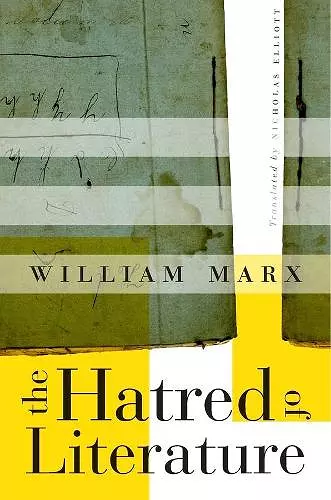The Hatred of Literature
William Marx author Nicholas Elliott translator
Format:Hardback
Publisher:Harvard University Press
Published:26th Jan '18
Currently unavailable, and unfortunately no date known when it will be back

For the last 2,500 years literature has been attacked, booed, and condemned, often for the wrong reasons and occasionally for very good ones. The Hatred of Literature examines the evolving idea of literature as seen through the eyes of its adversaries: philosophers, theologians, scientists, pedagogues, and even leaders of modern liberal democracies. From Plato to C. P. Snow to Nicolas Sarkozy, literature’s haters have questioned the value of literature—its truthfulness, virtue, and usefulness—and have attempted to demonstrate its harmfulness.
Literature does not start with Homer or Gilgamesh, William Marx says, but with Plato driving the poets out of the city, like God casting Adam and Eve out of Paradise. That is its genesis. From Plato the poets learned for the first time that they served not truth but merely the Muses. It is no mere coincidence that the love of wisdom (philosophia) coincided with the hatred of poetry. Literature was born of scandal, and scandal has defined it ever since.
In the long rhetorical war against literature, Marx identifies four indictments—in the name of authority, truth, morality, and society. This typology allows him to move in an associative way through the centuries. In describing the misplaced ambitions, corruptible powers, and abysmal failures of literature, anti-literary discourses make explicit what a given society came to expect from literature. In this way, anti-literature paradoxically asserts the validity of what it wishes to deny. The only threat to literature’s continued existence, Marx writes, is not hatred but indifference.
Literature has faced myriad accusations from the powers that be, who have…criticized its immortality, contested its truth value in comparison with science, and attacked the figure of the writer… Paradoxically, it is anti-literary discourse that has created the identity of literature. [William Marx] turns poets and novelists into eternal resistance fighters defending from the margins an art without faith or law, a practice that has no stable definition or real place in society… It is thus a secret war that Marx describes, with humor and erudition worthy of Umberto Eco. * Marianne *
If the defenders of literature often admit that they do not know how to define literature, its critics are very happy to take up the charge. Beginning with Plato…William Marx examines four aspects of the vast indictment that has been brought against poetry… The Hatred of Literature is not a judicial appeal, but a reflection on how difficult it is to define an art that, over the centuries, has rejected everything it could have laid claim to and as a result has been forced to fall back on itself. * Le Monde *
An in-depth history of literature as it is understood by its most virulent detractors—the age-old purveyors of ‘anti-literature.’ From Plato’s condemnation of poetry to contemporary attempts to ban ‘triggering’ books, literature has long been subjected to intellectual assault by philistines and philosophers alike…In an age in which the study of literature, and the arts in general, seems particularly vulnerable, Marx’s book is exceedingly relevant. -- Andrew Shea * New Criterion *
Those who have spent their lives hating literature have done so because it’s always been a threat to the status quo or ruling parties…In his comprehensive and rich examination of how and why literature has always been on trial, Marx’s The Hatred of Literature carefully spells out how the four indictments (Authority, Truth, Morality, and Society) against the form have served to threaten our existence as thinking people and weaken the fabric of society…Marx looks at literature through the eyes of its foes. He weaves in political leaders, philosophers, theologians, and professorial types whose missions often seem to be at odds with the more high-minded pursuits of the form. -- Christopher John Stephens * PopMatters *
[Marx’s] book is a sparkling constellation of wit, learning and insight. -- Gary Day * Times Higher Education *
Defining literature by its enemies is a neat strategy—and thanks to Marx’s light touch, the book is fun to read. I suspect that Marx secretly likes the attacks he describes with so much relish because they dovetail with his own view of literature as standing in opposition to powerful discourses such as philosophy, science, morality, religion, and social utility. -- Martin Puchner * Public Books *
ISBN: 9780674976122
Dimensions: unknown
Weight: unknown
240 pages